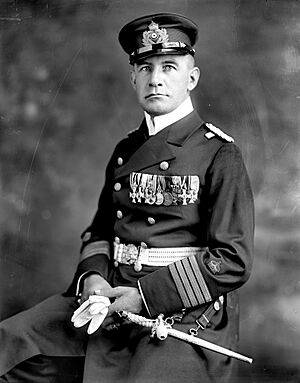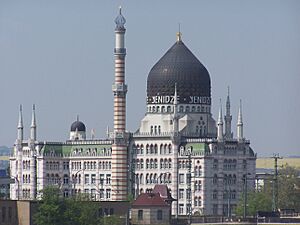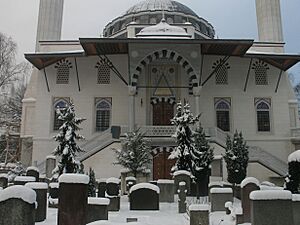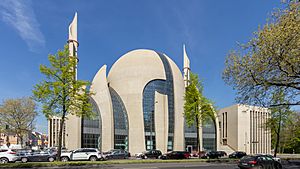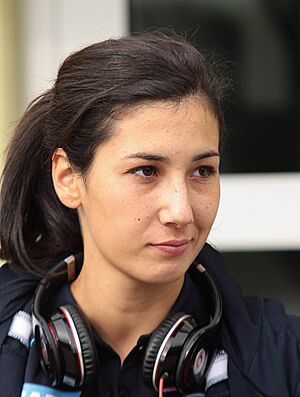Turks in Germany facts for kids
| Total population | |
|---|---|
| 1.3 million with Turkish citizenship (Statistical Office of the European Union 2023) 2,926,000 million with a migration background from Turkey (including other ethnic groups) (2023 estimation) |
|
| Regions with significant populations | |
| Languages | |
| Turkish, Kurdish, German, English | |
| Religion | |
| Mostly Sunni Muslim, partly Alevi, agnostic, atheist, Christian or other religions |
Turks in Germany are people of Turkish background who live in Germany. They are also called German Turks or Turkish Germans. This group includes people born in Germany who have Turkish parents or grandparents.
However, not everyone in Germany with family roots in Turkey is ethnically Turkish. Many also have Kurdish heritage. Some are from Christian groups like Assyrians or Armenians. There are also Turkish communities from other parts of Europe or the Levant, like Balkan Turks or Turkish Cypriots. Today, Turkish people form the largest ethnic minority in Germany. They are also the biggest group of Turkish people living outside Turkey.
Most Turks in Germany came because of the Gastarbeiter (guest worker) programs. These programs happened in the 1960s and 1970s. In 1961, Germany needed more workers for its growing economy. So, Germany and Turkey made an agreement. This allowed German companies to hire Turkish workers. About 650,000 workers came from Turkey during this time. Many also brought their families with them.
Turkish people who moved to Germany brought their culture. This included the Turkish language.
Contents
A Look at Their History
Early Turkish Visitors
Long ago, during the Crusades, European armies fought in the Middle East. They sometimes captured Turkish soldiers. These prisoners of war were brought back to Europe. Some women were baptized and married. Men, and even children, were also brought to Germany. They were called Beutetürken, meaning 'booty Turks'.
The first Turk we know about in Germany was Sadok Seli Soltan. He lived from about 1270 to 1328. He was a Turkish officer captured in 1291. He later married and became "Johann Soldan". His family grew and became well-known in Germany.
Many famous Germans are descendants of this family. For example, the famous writer Johann Wolfgang von Goethe had Turkish ancestors. Other family members became lawyers, artists, and business owners. The Soldan family still uses a crescent and star on their family symbol.
Turks from the Ottoman Empire
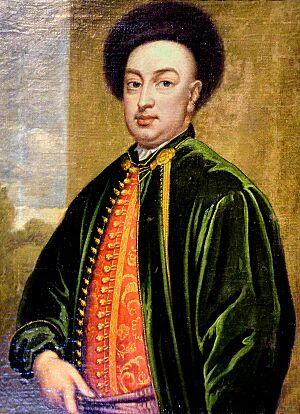
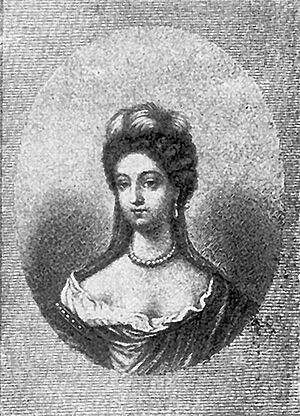
Turkish people had more contact with German states by the 1500s. This was when the Ottoman Empire tried to expand its lands. The Ottomans tried to capture Vienna twice. The second time was in 1683. After this battle, many Turkish soldiers were left behind or captured. About 500 Turkish prisoners were made to live in Germany.
Some Turks became traders or took on other jobs. Some did very well. One Ottoman Turk even joined the nobility in Hanover. Many also became Christian priests or pastors.
More wars followed, and more Turks were captured. Some women were also taken. One Turkish captive named Fatima became the partner of Augustus II the Strong. They had two children. Their son, Frederick Augustus Rutowsky, became a military commander. Records show that many Turks in Germany became Christian during this time.
Later, Prussian kings hired Turkish soldiers. By 1731, about 1,000 Muslim soldiers served in the Prussian army. The king, Frederick the Great, believed in religious freedom. He said that if Turks came, he would build mosques for them.
In 1798, the first Muslim cemetery was built in Germany. Later, in 1866, the Ottoman sultan was allowed to support a mosque in Berlin.
Trade agreements between the Ottomans and Prussians encouraged people to travel. The Turkish community in Germany, especially in Berlin, grew a lot before World War I. This led to Turkish-style buildings in Germany. For example, the Yenidze cigarette factory in Dresden looks like a mosque.
Some Germans and Turks also married. Karl Boy-Ed, a German diplomat, was from a German-Turkish family.
Turks from the Republic of Turkey

Heuss-Turks: Early Arrivals
The "Heuss Turks" were about 150 young Turkish people. They came to Germany in 1958. This was after German President Theodor Heuss invited Turkish students. They came for job training, some at a Ford factory. This was before the main guest worker program started in 1961. They were welcomed warmly by their German co-workers.
Students and Workers
The Turkish Student Federation in Germany (ATÖF) was formed in 1962. It brought together Turkish student groups across Germany. It helped Turkish students until it closed in 1977.
In the 1950s, West Germany had a strong economy. The building of the Berlin Wall in 1961 stopped people from moving from East Germany. This made the worker shortage worse. So, on October 30, 1961, West Germany invited Turkish workers. At first, their visas were for two years. But this rule was soon changed.
Most Turkish immigrants planned to work for a while and then return home. They wanted to save money to build a new life in Turkey. Many did go back during economic slowdowns in the 1960s and 1970s. The German government even offered money to encourage them to return. However, most Turkish immigrants stayed.
This was partly because of new laws in 1974. These laws allowed Turkish workers to bring their families to Germany. So, between 1974 and 1988, the number of Turks in Germany almost doubled. More women also came to work in jobs like electronics and textiles.
After the fall of the Berlin Wall in 1989, Germany reunited. There were many discussions about who was a German citizen. Some people showed negative feelings towards immigrants. Turkish communities felt unsafe. There were many reported cases of violence against immigrants. This led to more support for Germany as a "multicultural" society.
For a long time, German citizenship was based on having a German parent. This meant children born in Germany to Turkish parents were not automatically citizens. In 1990, new laws made it easier. Turkish workers could apply for permanent residency after eight years. Children born in Germany to foreign parents could become citizens at 18. But they had to give up their Turkish citizenship.
In 1999, the rules became even more open. Non-citizens could become citizens after eight years of living in Germany. Children born in Germany to foreign parents automatically became citizens if one parent had lived there for eight years. These children could have dual citizenship until age 23. Then they had to choose one.
After these changes, many Turks became German citizens. In 2000, 83,000 people of Turkish origin became German citizens. By 2011, about 2 million Turks had German citizenship.
Turks from the Balkans
Bulgaria


Some Turkish Bulgarians came to Germany after 1974. This was when family reunification laws started. Some Turkish workers from Turkey actually had Bulgarian citizenship. They were part of the Turkish minority who left Bulgaria during the communist era.
More Turkish Bulgarians came after communism ended in Bulgaria in 1989. Many faced economic problems and unfair treatment. So, they sought safety in Germany.
Since Bulgaria joined the European Union, more Turkish-speaking Roma people from Bulgaria have come to Germany. They can move freely within the EU. They often find jobs through the established Turkish-German community.
Greece
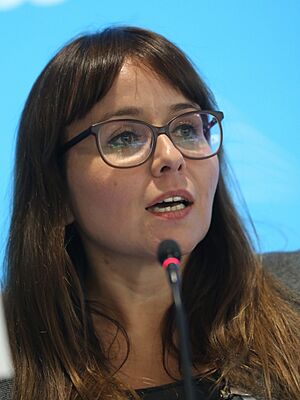
From the 1950s, the Turkish minority from Greece began to move to Germany. Many planned to return to Greece. But a new Greek law made it hard. This law allowed the government to take away citizenship from "non-ethnic" Greek citizens who left the country. This law affected Turks from Western Thrace studying in Germany. It was not removed until 1998.
Despite the risk, many Western Thrace Turks kept moving to Germany. In the 1960s and 1970s, the tobacco industry in Thrace faced problems. Many farmers lost their income. Between 1970 and 2010, about 40,000 Western Thrace Turks moved to Western Europe. Most settled in Germany. Another 30,000 left between 2010 and 2018 due to Greece's economic crisis. About 80% of these 70,000 immigrants live in Germany.
In 2013, Cemile Giousouf became the first Western Thrace Turk to join the German parliament. She was also the first Muslim elected for the Christian Democratic Union party.
North Macedonia
Some people from the Turkish Macedonian minority group have also come to Germany. They came alongside other citizens of North Macedonia.
Romania
Between 2002 and 2011, the number of Turkish Romanians decreased a lot. This was after Romania joined the European Union. Turkish Romanians, especially from the Dobruja region, moved to Germany and other European countries.
Turks from the Levant
Cyprus
Turkish Cypriots started leaving Cyprus for Western Europe in the 20th century. This was due to economic and political reasons. Many left after conflicts in 1963-64 and 1974. After 2004, when the EU expanded, Turkish Cypriots with Cypriot citizenship could live and work in Germany. As of 2016, about 2,000 Turkish Cypriots live in Germany. This is the second largest group in Western Europe.
The Turkish Republic of Northern Cyprus (TRNC) helps its citizens in Germany. They have offices in Berlin and Cologne. These offices also help build good relations between Northern Cyprus and Germany.
Lebanon
Many Turkish Lebanese people have sought safety in Turkey and Europe. This was due to wars in Lebanon since the 1970s. Many knew about the large Turkish-German population. They hoped to find work in Europe. The biggest wave of Turkish Lebanese migration happened during the 2006 Israel-Lebanon war. More than 20,000 Turks fled Lebanon and settled in Europe, including Germany.
Iraq
In 2008, about 7,000 people from the Turkish Iraqi minority group lived in Germany. This was about 8.5% of all Iraqis in Germany. Most of them live in Munich.
Syria
The Syrian Turkmen Culture and Solidarity Association – Europe (STKYDA) was started in Germany. It helps the growing Syrian Turkmen community. Many Syrian Turkmen arrived during the European migrant crisis in 2014-2015. This group includes young activists from all Syrian cities.
Turks from the Modern Diaspora
More recently, Turkish people from other countries have also moved to Germany. For example, some Turkish Dutch people have come to Germany.
Population and Where They Live
Population Numbers
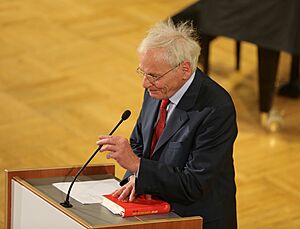


The German government does not ask people about their ethnic background. So, official numbers do not show how many ethnic Turks live in Germany. However, in 2023, about 3 million German residents had family roots in Turkey.
Experts have made different guesses about the number of Turks in Germany. In the 1990s, some said there were between 2.5 and 3 million. Others estimated more than 3 million, including third-generation descendants. Some even suggested 4 to 5 million people of Turkish origin.
Where They Live

Most Turkish people in Germany live in cities. They are mainly found in former West Germany. This includes industrial areas like North Rhine-Westphalia, where one-third of Turkish Germans live. Many also live in Baden-Württemberg.
They often live in working-class areas of big cities. These cities include Berlin, Hamburg, Cologne, Dortmund, Frankfurt, Hanover, Munich, and Stuttgart. In 2011, districts like Duisburg and Gelsenkirchen had the highest numbers of people from Turkey.
Moving Back to Turkey
Many Turkish citizens and Turkish Germans have also moved from Germany back to Turkey. They go for retirement or work reasons. German records show about 2.8 million "returnees". However, the German Embassy in Ankara thinks the real number is closer to four million. This is because many people do not officially report their move back.
Integration and Culture
Integration Challenges
Turkish immigrants are the largest immigrant group in Germany. They have faced challenges with integration. In 2011, Turkish Prime Minister Recep Tayyip Erdoğan visited Germany. He told Turks to integrate but not to lose their own culture. This caused a lot of discussion in Germany.
Sometimes, Turks in Turkey have negative views of Turks in Germany. They might see them as too conservative. They are sometimes called almancı, meaning "German-er". Some feel they haven't fit in enough with Germans. Others feel they have fit in too much with Germans.
Citizenship Changes
For many years, Turkish citizens in Germany could not easily become German citizens. German law was based on "blood ties". This meant you needed a German parent to be a citizen. Germany did not see itself as a country of immigration. So, only those with a German parent could get citizenship.
In 1990, the law changed a bit. Turkish workers could apply for permanent residency after eight years. Children born in Germany to foreign parents could become German citizens at 18. But they had to give up their Turkish citizenship. Dual citizenship was not allowed. Chancellor Helmut Kohl worried that allowing it would greatly increase the Turkish population.
However, in 1999, the government made the laws even more open. Non-citizens could become citizens after eight years of living legally in Germany. Children born in Germany to foreign parents automatically became citizens. This happened if at least one parent had lived there for eight years. These children could have dual citizenship until age 23. Then they had to choose one.
Former Turkish citizens who give up their citizenship can get a 'Blue Card'. This card gives them some rights in Turkey. For example, they can live and work there. But they cannot vote.
In 2000, after the law changed, a record number of people became German citizens. About 44% of them were of Turkish origin. Over the next 20 years, 630,000 more Turkish people became German citizens. By 2005, 2 million Turks already had German citizenship.
Culture and Traditions
Turkish people who moved to Germany brought their culture. This includes their language, religion, food, and arts. These traditions have been passed down to their children. Turkish Germans have also shared their culture with German society. You can find many Turkish restaurants, grocery stores, tea houses, and mosques in Germany. German culture has also influenced the Turkish spoken by the community.
Turkish Food in Germany
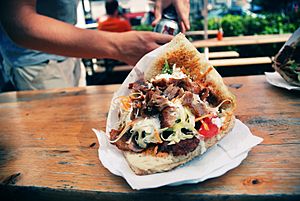
Turkish food first came to Germany in the 1500s. It was mostly eaten by rich families. But Turkish food became popular for everyone after Turkish immigrants arrived in the mid-1900s. By the early 1970s, Turks started opening fast-food places. They sold popular dishes like döner kebap. Today, you can find Turkish restaurants everywhere. They sell quick take-away food and traditional home-cooked meals. Turks also opened grocery stores and markets. They sell spices, fruits, and vegetables for Turkish cooking.
Language Spoken
Turkish is the second most spoken language in Germany. It came with Turkish immigrants. Many immigrants learned German at work and in daily life. German became a second language for them. Most Turkish immigrants taught their children their native language. Turkish Germans often learn both languages from a young age. They speak Turkish at home and German at school.
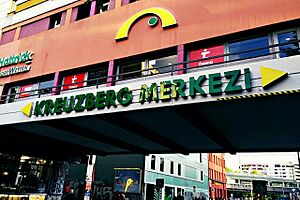
Turkish Germans usually speak German more fluently than Turkish. They might speak Turkish with a German accent. They also sometimes mix German grammar into Turkish. Parents often encourage their children to improve their Turkish. They might send them to private classes. In some German states, Turkish can even be studied for the Abitur (final exams).
Turkish has also influenced German society. You can see advertisements and signs in public places written in Turkish. It is even used by some non-Turkish children in areas with many Turkish communities.
People in the Turkish community often switch between German and Turkish. A new way of speaking German, called Kanak Sprak or Türkendeutsch, was created. It describes the German spoken by some Turkish youth. But as more Turkish Germans become professionals, more speak standard German very well.
Religion and Beliefs
Most Turkish people in Germany are Muslim. They form the largest group practicing Islam in Germany. Since the 1960s, "Turkish" has often been linked with "Muslim". This is because Islam in Germany often has a "Turkish character". This is clear in the Ottoman/Turkish style of many mosques. In 2016, about 2,000 of Germany's 3,000 mosques were Turkish. Many were funded by the Turkish-Islamic Union for Religious Affairs (DİTİB). This is a part of the Turkish government.
There is also a small Christian community of Turkish origin in Germany. Germany's biggest mosque is the Cologne Central Mosque. It was built by DİTİB and finished in 2017. It is also the biggest mosque in Europe outside of Turkey.
Sports and Achievements
Football Stars



Many football players of Turkish origin in Germany have been very successful. They play for top clubs in Germany, Turkey, and other European countries. When it comes to national teams, many born in Germany have chosen to play for the Turkey national football team. However, more players are now choosing to play for Germany.
The first person of Turkish descent to play for the Germany national football team was Mehmet Scholl in 1993. Later players include Mesut Özil, İlkay Gündoğan, and Emre Can. Mesut Özil played the most games for Germany.
Players who chose to play for Turkey include Cenk Tosun, Nuri Şahin, and Hakan Çalhanoğlu. Some Turkish-German players also play for other national teams, like Azerbaijan.
Several Turkish-German football players have become coaches. There are also Turkish-German referees, like Deniz Aytekin.
Women's Football
In women's football, several players have chosen to play for the Turkish women's national team. These include Aylin Yaren and Melike Pekel.
Other players, like Sara Doorsoun, play for the German women's national team.
Turkish-German Football Clubs
The Turkish community in Germany has also started its own football clubs. Examples include Berlin Türkspor 1965 and Türkiyemspor Berlin. Türkiyemspor Berlin won the Berlin-Liga in 2000. Türkgücü München, started in 1975, plays in the 3. Liga.
Notable People
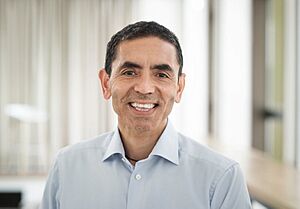
Many people of Turkish origin have become famous in Germany. For example, Uğur Şahin and his wife Özlem Türeci developed the COVID-19 vaccine for BioNTech. They became some of the wealthiest people in Germany.
See also
 In Spanish: Inmigración turca en Alemania para niños
In Spanish: Inmigración turca en Alemania para niños
 | Dorothy Vaughan |
 | Charles Henry Turner |
 | Hildrus Poindexter |
 | Henry Cecil McBay |


